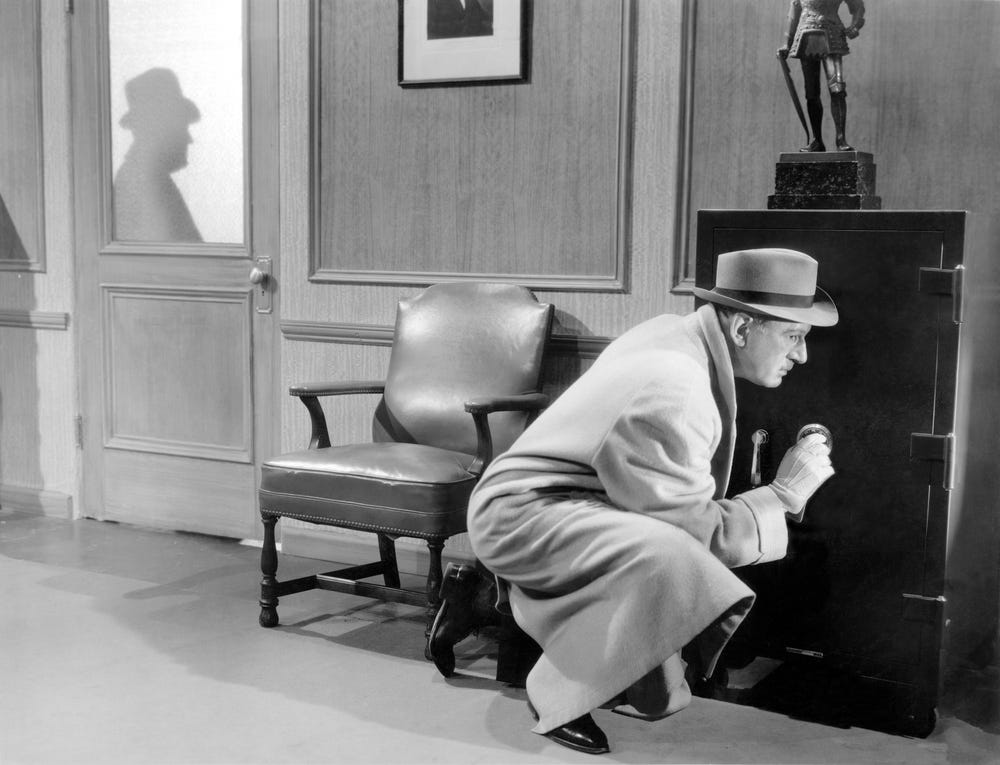Money needed as New South Wales regulator demands answers.
Caesars puts $4m towards anti-sports betting campaign in Missouri.
Industry dunks on federal sports-betting bill.
Political betting to and fro continues.
It's just yer money I'm after, baby.
Staving off disaster
Bangers and cash: The besieged Australian casino operator Star Entertainment has secured a A$100m ($67.5m) cash injection in order to hold the company together, even as the New South Wales regulator has issued a show cause notice asking why the company should not face disciplinary action.
McCann do spirit: The Australian Financial Review has reported that Star has managed to persuade lenders to stump up the new cash. The money comes with a five-point plan that the paper suggested would allow new Star CEO Steve McCann the opportunity to turn around the business.
The AFR reported the fresh funds are designed to cover short-term expenses, including the costs from the launch of the Queen’s Wharf casino in Brisbane.
The paper added that Star also needs to prove its financial viability to the New South Wales Independent Casino Commission (NICC) by the end of next week.
Cause trouble: The move from the regulator comes after the damning findings of the Bell II report, which found the company not fit to run a casino in the state.
Last Friday, two weeks after the publication of the report, the NICC offered a show cause notice to the company.
Star said it would comply with the 14 days given – up to September 27 – to explain why disciplinary action should not be taken.
The company said it was “currently considering the matters raised in the notice” as well as the additional requests from the NICC.
It added that as of last Friday it was ”continuing to work with various stakeholders and advisers in respect of its financial position.”
Suspension bridge: Star Entertainment shares continue to be suspended from trading on the Australian Securities Exchange for failing to file its latest financial results on time.
McCann’s five-point plan includes additional loans, duty relief in Queensland, cost cuts, asset write-downs and the sale of non-core assets.
Capital-raising ideas include the potential sale of convertible notes and super senior debt that would sit on top of the lending group’s A$330m senior secured loans.
Optimize Your Geolocation Services with Xpoint's Trust Mode™
Elevate your operations with Xpoint’s groundbreaking Trust Mode™, designed to streamline geolocation processes and deliver unmatched efficiency.
Getting the most from your geolocation provider
Xpoint’s technology minimizes checks while remaining compliant. Our proprietary Trust Mode™ feature reduces geolocation checks as it verifies when a player is connected to residential or office WiFi, even near state borders, ensuring that operators adhere to jurisdictional regulations..
Cost-effective without compromising security
As operators typically pay per geolocation check, Xpoint’s clients will save over 20% in costs as the number of checks required is reduced without sacrificing accuracy.
Looking to learn more?: Trust Mode™
Contact us here: https://xpoint.tech/contact-us
+More
Thailand’s plan to legalize casino gambling with the creation of three venues and seven integrated resorts should not come at the cost of letting a monopoly dominate the sector, opposition figures have warned the government.
Philippines: The official executive order banning POGOs is expected to be introduced in two weeks. Presidential Anti-Organized Crime Commission executive director Gilbert Cruz has said a draft is already prepared. Additionally, Sen. Sherwin Gatchalian still plans to pursue a ban of POGOs through the legislature and is considering increasing restrictions on eGames.
A Swedish gambling trade association is asking operator members how they think efforts to tackle anti-money laundering and terrorist financing can be improved. The results of the Swedish Trade Association for Online Gambling’s AML State of Play survey will be released later this year.
Senior Norwegian figures are calling time on the country’s state gambling monopoly, the last of the Scandinavian holdouts following Finland’s decision to introduce a licensing model.
Norway’s Conservative Party has published a manifesto that promises to liberalize the market by 2028, signaling the end of the two state-run operators Norsk Tipping and Norsk Rikstoto.
Cambodia: Casino owner Ly Yong Phat is facing sanctions from the US Department of the Treasury’s Office of Foreign Assets Control for using human trafficking to operate scam centers. His company’s O-Smach Resort casino was reportedly used as a way to lure and trap people with fake employment opportunities between 2022 and 2024.
Staying with Cambodia, its casino operators have until the end of this year to register their machines and properties or face being shut down by the government under new regulations that cover the movement of equipment through the country.
Tombola is quitting the Netherlands after three years, citing tougher regulations and a gambling tax increase for “pulling the plug”, according to an announcement on the operator’s site, which dates the exit as October 1.
Japanese police have arrested three men for allegedly washing around $35m through illegal casinos. Osaka officials named 41-year-old Yukiko Han, 40-year-old Yuya Santanda and 40-year-old Hatsuyo Kinoshita, all company executives of the Osaka Prefecture region. Money paid to their bank accounts was traced to an offshore Yous casino.
Daggers drawn
With friends like these: Caesars Entertainment has emerged as one of the key funders behind the anti-sports betting campaign in Missouri, with filings showing the company has put $4m into the campaign.
Caesars owns three casinos in Missouri, the Harrah’s North Kansas City, the Horseshoe St Louis and the Isle of Capri Casino Boonville.
Each is listed as having donated money to Missourians Against the Deceptive Online Gambling Amendment.
Now we know: The MADOGA campaign was launched last week to combat the lobbying efforts of Winning for Education Missouri, which is largely funded by DraftKings and FanDuel and is supported by the state’s major sports teams.
The ant-gambling PAC was formed after a legal ruling ensured a question about sports betting would appear on November’s ballot paper.
The legal effort was brought by political consultants Jacqueline Wood and Blake Lawrence.
It was led by lawyer Marc Ellinger, who has previously represented the Missouri Gaming Association.
Claim/counterclaim: The MADOGA claims the tax benefits of regulating sports betting are overstated by Winning for Education Missouri. The PAC has pointed out that, with operators able to deduct promo expenses from their tax bills, the tax take will be minimal.
Un-SAFE
Safe cracked: Proposals floated by two US lawmakers to federally regulate sports betting have been met with dismissal by industry figures.
The Supporting Affordability and Fairness with Every Bet Act (SAFE Bet Act), drawn up by New York Rep. Paul Tonko and Connecticut Sen. Richard Blumenthal, seeks to “address the public health implications inherent in the widespread legalization of sports betting.”
The act, introduced after months of fanfare, bids to ensure states where sports betting is legal introduce minimum federal standards in advertising, affordability and AI.
In a press conference, Blumenthal said there was no intention of banning sports betting, merely an attempt to make it safer for the public.
“State regulation is faint-hearted and half-baked,” he said. “That’s why we need a national standard – not to ban gambling – but simply to take back control over an industry that is out of bounds.”
Slap my pitch up: However, several operator groups and consultancy experts told C+M the bill has “almost no chance” of passing in its current form. Chris Cylke, senior vice-president of government relations at the American Gaming Association, called it “a slap in the face” to state regulators and gaming operators.
The iDevelopment and Economic Association (iDEA) lobby group said it was “deeply concerned” and called the legislation “an unnecessary and harmful federal overreach.”
In a statement, iDEA said: “The SAFE Bet Act’s blanket, one-size-fits-all requirements on advertising, affordability checks and artificial intelligence stifle the autonomy of states and tribal governments, many of which have implemented their own robust regulatory frameworks tailored to the needs of their constituents.”
The measures infringe on states’ rights and “risk undermining the operational flexibility that has allowed the legal sports-betting industry to thrive”, iDEA said.
“The SAFE Bet Act creates an unnecessary intrusion into state regulated activity,” added gaming lawyer Jeff Ifrah of Ifrah Law.
“If Congress wants to suddenly weigh in on gaming, it should do so by helping to shut down offshore sportsbooks that violate federal law.”
Chart Your Unique Path with Mindway AI
Discover a new level of customisation with Mindway AI. Our advanced algorithms are trained on your own player data, creating a bespoke solution that adapts to your regulatory needs, cultural nuances, product types, and customer profiles. At Mindway AI, we’re dedicated to crafting solutions that fit your unique needs perfectly with deployment options of cloud-based or on-premise. With our innovative technology, you get a personalized approach that enhances player protection and promotes responsible gaming. Ready to see how a tailored RG solution can transform your operations?
Reach out to Mindway AI today.
Political roadblock
Across the great divide: The back and forth over election betting in the US saw further developments late last week as a federal appeals court issued a freeze on trading on Kalshi following a move from the Commodity Futures Trading Commission.
Kalshi had gone live with its betting markets on Thursday only for it to be halted once again later the same day.
Interactive Brokers also announced on Thursday ahead of the CFTC’s last-minute appeal move that it would be going live with its own election markets.
Tsunami: In a filing on Saturday, the CFTC warned “an explosion in election gambling on US futures exchanges will harm the public interest."
“The district court’s order has been construed by Kalshi and others as open season for election gambling,” the filing continued.
“As trading commences on Kalshi’s election event contracts, even if only briefly, there is an acute risk of short-term manipulation of election markets and threats to election integrity.”
Kalshi hit back, saying such claims were “unsubstantiated and baseless.”
Attention now turns to the US Court of Appeals for the DC Circuit, which could rule as soon as this week on whether to let Kalshi resume trading.
Alternatively, the court may rule the contracts should be frozen pending further litigation, potentially all the way through to the November elections.
A short history of election betting: Kalshi has been fighting the CFTC for over 12 months regarding election betting. The company filed to list election markets last year, but was denied by the authority.
GuardDog, powered by Underdog, is a pioneering investment fund dedicated to fostering innovation in responsible gaming.
GuardDog supports and accelerates early-stage startups focused on building new and creative solutions to address problem gaming and further responsible gaming.
Ready to be one of the underdogs of responsible gaming?
Visit to apply: https://underdogfantasy.com/guarddog
Calendar
Sep 24-26: SBC Player Protection Summit, Lisbon
Oct 7-10, G2E, Las Vegas
Nov 5: Gaming in Germany, Berlin
An +More Media publication.
For sponsorship inquiries email scott@andmore.media.











